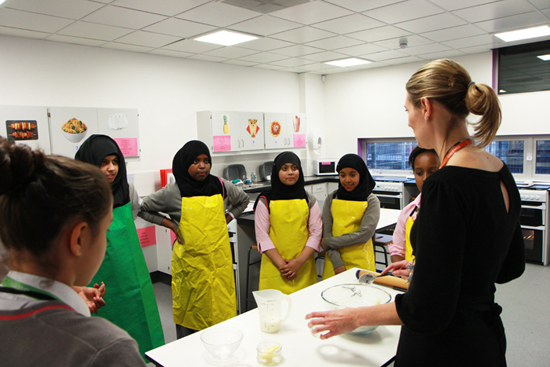Food Preparation and Nutrition
Overview

Curriculum Content
Food Preparation and Nutrition Intent Statement
Food Preparation and Nutrition Curriculum
Key Stage 3
In KS3 pupils learn a broad range of basic cooking skills as part of life skills. Students will have 15 lessons in Food Preparation and Nutrition in year 7 and 8, and 10 lessons in year 9. In year 7 students will study enzymatic browning, yeast fermentation, food groups and environmental issues in food production. Practical work includes vegetable soup, herby scones, fruit crumble, couscous salad, bread making, vegetable pizza and macaroni and cheese. In year 8 students will study bacteria, temperature control, nutrients, special diets, sustainability and ethical issues in food production. Practical work will include chicken fajitas, vegetable curry, bolognese sauce, victoria sponge cake and lemon cheese cake. In year 9 students will study the use of microorganisms in food production, nutrition at different life stages and the changing properties of protein/foams. Practical work will include vegetable stir fry (julienne cut), coleslaw and mayonnaise, pasta making and meringue nests.
Study at Home for KS3
Recommended books, websites and other resources:
Ways for parents to support learning
GCSE Assessment Components
In KS4 we follow the AQA Food Preparation and Nutrition specification.
Non exam-assessment 50% of final grade (this includes practical work)
Written exam 50% of final grade
The following topics will be covered:
-
Food, Nutrition and Health. Gaining knowledge of nutrients, functions and sources. Understanding the future health implications of over and under nutrition. Application of knowledge in different scenarios and life stages.
-
Food Science. Gaining knowledge and understanding of the functional and chemical properties of protein, fats and carbohydrates. Develop a clear understanding of how to conduct scientific investigations into chemical and functional properties of ingredients.
-
Food Safety. Gaining knowledge of preparing and storing food safely. Understanding how to prevent pathogens from causing food poisoning through temperature control. Understanding the benefits of microorganisms in food production.
-
Food Choice. Demonstrating awareness of influences on food choice. Gaining knowledge and understanding of cultural, religious and moral food choices. Develop a clear understanding of British and international cuisine.
-
Food Provenance. Applying knowledge and understanding of food provenance to provide solutions to sustainable food production and food insecurity worldwide
Students will focus on two non-exam assessment tasks determined by the AQA:
-
Food Investigation - understanding of the working characteristics, functional and chemical properties of ingredients.
-
Food Preparation Assessment - knowledge and understanding in relation to the planning, preparation, cooking and presentation of food and nutrition.
Study at Home for KS4
Recommended websites
Revision Guide
GCSE Food Preparation and Nutrition for AQA (Grade 9-1)
ISBN 978 1 78294 649 6
Contact
Please contact the Head of Food and Nutrition, cornelia.debruin@egas.islington.sch.uk, if you would like more information about the course.


